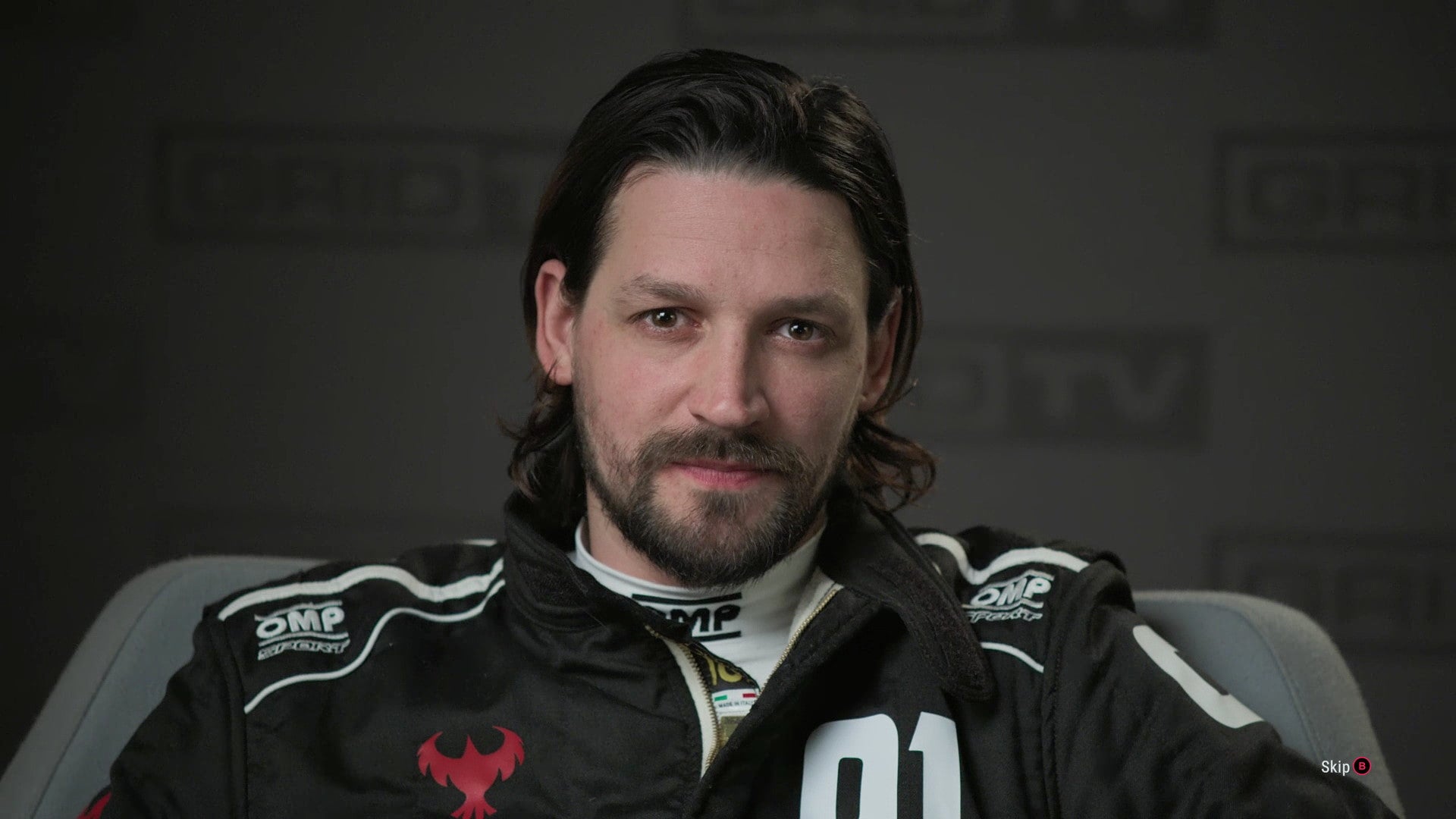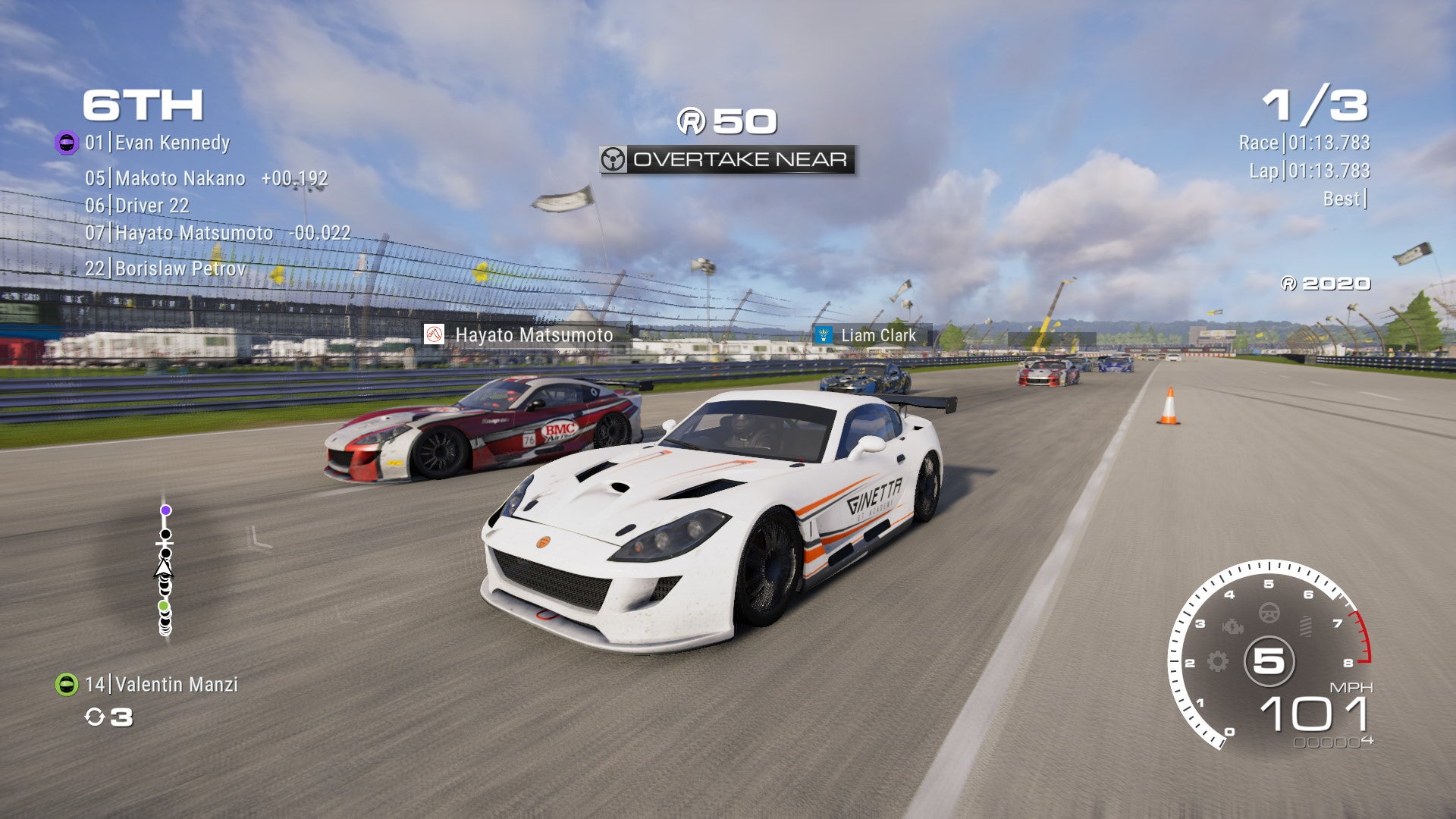The second biggest change is that headline addition of a live-action story mode. Channeling Codemasters’ own TOCA Race Driver 2 from 2004, there are cutscenes before each of the races in Story Mode, as you join the struggling Seneca racing team and take on long-time rivals Ravenwest with their star driver, Nathan McKane. It’s great to put a face to that name after all these years and he’s suitable greasy. While the story is reasonably well-scripted and acted by the ensemble cast, it nonetheless feels almost exactly like Braking Point, the CG-rendered story mode from F1 2021. It’s of similar quality, so if you enjoyed that then you should like this too, though it’s perhaps fair to point out that there’s only so much you can do when it comes to a racing game story. But what wholly justifies the inclusion of the story mode is that all-important sense of rivalry. It makes a huge difference to your emotional investment when you have a named rival to chase during races, and Grid Legends leverages McKane’s presence to great effect. I genuinely wanted to beat him and the rest of the core cast every time I saw their names in front of me. Complementing this is the returning Nemesis feature, which turns AI opponents nasty if you bump into them too much. They do indeed lunge for you when they’re triggered, which is fun, but the actual criteria for them turning against you feels arbitrary. Just drafting them down a straight can cause the nemesis state to engage or, worse still, they’ll spin out of their own accord and slew into you as they roll sideways across the track, which apparently is your fault too. Suddenly you’ve got nemeses all around as you protest your innocence, but it all adds to the entertainment. Story mode is done and dusted in about seven hours if you’re reasonably proficient, although that will vary depending on your difficulty level choice. Difficulty in general is a little unbalanced, and the hardest difficulty can feel too hard compared to the next one down, which can be too easy. There are still outlier races that are too hard or too easy throughout the game, so sadly there’s no one setting that works for everything. For realistic opponents, there’s another commendably solid multiplayer offering, now with 22 cars on-track at the same time, with mid-race drop-in enabled. Adding trucks to the racing mix has proved a great idea, as they lean precariously around Parisian streets, leaping over jumps and bunnyhopping each other with abandon. It’s silly, not too fast, and perfect for online play, as is the returning drifting discipline. It’s surprisingly good fun seeing 20 drivers drifting as ghosts around the same track. You can also create your own race with any combination of tracks and cars - even choosing two completely different disciplines to share the track at the same time, complete with a head-start for the slower vehicles. Besides story mode there’s also a large career mode, though it does feel like filler, with the usual tiered events to unlock by basically grinding the same gameplay. Annoyingly, some events only open up once you’ve hit a certain upgrade level on a specific vehicle type, which can mean replaying already-completed career events just to get enough miles in that car to unlock its mods. The mods seem ultimately pointless too, as the game just isn’t the kind where you’ll hunt for a tenth here or there. Without wanting to oversimplify such a proficient creation, it’s an ‘accelerate or brake and turn left or right’ kind of game - and there’s nothing wrong with that. In fact it’s refreshingly straightforward. For a racing game with these sensibilities to succeed, it needs to be three things: smooth, pretty and full of spectacle. It’s certainly smooth - at Ultra settings at 1080p on an Nvidia RTX 2070, the game is gorgeous, only faltering when you’re using cockpit cam in the rain with 20 cars on the screen, at which point it can be seen to (just) dip under 60fps. But otherwise it absolutely purrs - this is one of the best racing game engines ever made. Secondly, it is very pretty, with sumptuous lens flare and lighting effects and ultra-solid cars and environments. There’s a little detail draw-in evident, even on Ultra, but you have to really look for it. Nobody should have any complaints about the visuals, even on mid-range graphics cards. But you might have complaints about that third element: spectacle. On the one hand, the game does a great job of creating drama, be it a blow-out on an enemy car that sends them flipping down the straight, or an engine giving up, sending smoke billowing from the back of their car. Such incidents rarely happen to you (and even a car with a puncture can be nursed to the end), but everyone else regularly has a torrid time. The other hand? The crashes still lack violence. Compared to Race Driver Grid from 2008, this feels distinctly neutered, which undoes so much of the game’s good work. You can just about rip a wheel off your car if you hit a wall at full speed, but it’s not a natural-looking collision by any means. Grid Autosport on Nintendo Switch has more convincing crashes than Grid Legends here on PC, and that doesn’t sit right. Maybe it’s time to ditch car licenses so we can have a proper, full-contact racing game again. Still, there’s loads here to like. It doesn’t feel like an all-time classic, probably because the original Race Driver Grid nailed the feeling of metal and rubber clattering down San Francisco hills far more convincingly. Think of this more as the track-based sibling of Dirt 5, with everything good and bad that comparison implies. But as with that game, there are few mass-market racers better than this in the current climate, so it’s definitely worth your attention.




